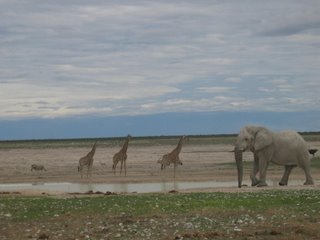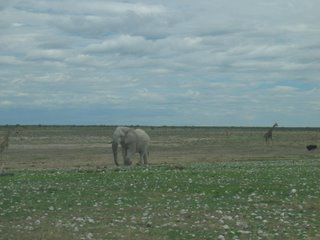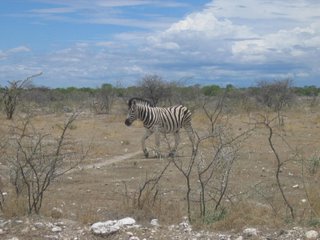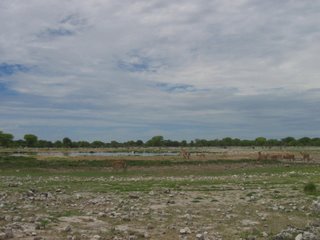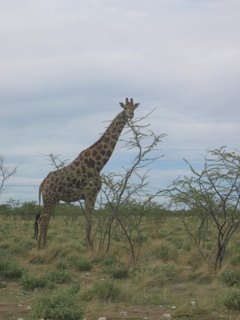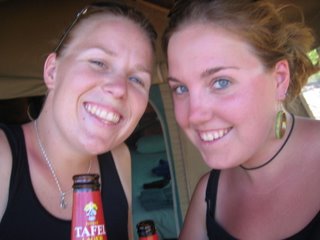A Family Affair
Anyway.
I had a surprise visit from my APCD Waldo a few weeks ago. Though his timing always seems a bit suspicious (last time he came during a cultural festival when the town was abuzz with food, crafts and festivities; this time, he arrived just in time to share my latest care package from home, consisting of Swedish fish and peanut butter cups… interesting…), he wasn’t here just to visit, but rather to review my first year of service as well as my secondary projects. “Secondary projects” are a mandatory part of PC service, though to me the requirement seems a bit random. Nearly everything I do outside my office could be considered a secondary project. PC service isn’t really a job; it’s a lifestyle. It’s 24-hours a day, 7-days a week. Everything I do somehow contributes to my work as a volunteer. Apart from my role in my primary projects, I fill numerous secondary roles in
Most days I feel like a teacher. Even on weekends or on days when I’m not working or in the school, the fact that I’m greeted as “miss” or “may frou” (a title of respect, required to be shown to all teachers) by the vast majority of young people I meet continually reminds me. Many days I feel like a counselor or therapist of sorts. Young people, especially young girls, very often make their way to my office to ask questions ranging from sexual health and boyfriend troubles to the latest school gossip or fashion trends in
However, not a single day goes by when I don’t feel like a mother. If I had no other secondary project during my service, being a parent to so many kids has to count for something. There are about 250 kids who live in my hostel, all of whom I would do most anything for. However, there is one band of kids, the “usual suspects” as we call them, who have become more like family than anything else. These are the kids who tap on my window on Saturday mornings with their standard greeting: “Miss, I’m awake!” And who proceed to lounge around my house for the rest of the day, cleaning, doing their wash, playing computer games, playing game boy, drawing on my bedroom walls, listening to “Dear Mama” on repeat on my ipod, napping in my bed, cooking porridge, watching movies, terrorizing our cat—finding anything to pass their time.

Levi and Mario doing their wash at my house.
 ...but no matter how much work there is to be done, they always make time to pose for a picture. This is one of my favorite pictures I've taken in Namibia.
...but no matter how much work there is to be done, they always make time to pose for a picture. This is one of my favorite pictures I've taken in Namibia.
This situation is typical of hostel life. As I’ve mentioned many a time, our house is constantly buzzing with young people. However, the usual suspects make up a special group of daily visitors. They are part of every single day of my life here. If they aren’t at my house at 6H00 to iron their school uniforms or get cold water to drink, they show up at my office at precisely 14H00 in the afternoon to talk about their day or watch me work or read encyclopedias (it keeps them busy for hours). They entertain themselves for the better part of the afternoon, and then at 17H00 we all make our way home together for dinner. Their movements are like clockwork to the point where if a certain time comes and goes without a word from them, I know for certain that something is wrong.
Bongos, Geraldo and Eslon, working hard to look tough for the picture. They made me promise to show this picture to people in America to prove how cool young Namibians are :)
Typical scene at my house by 6AM weekday mornings, the kids coming over to iron their school uniforms. They are religious about ironing their clothes and they take care of their uniforms as if they were gold.
The usual suspects, made up of all boys (as we live in the boys hostel) between the ages of 15 and 22, and I have been through a lot together. From trouble in school and physical violence, to sickness and death of family members and friends, I have bonded with these boys more than most people I know in
Ames, Mario, Levi and Michael- they're pretty good about sharing the Game Boy, as you can see.
Similarly, they have shared in my highs and lows. When my cell phone shows an incoming call from a private number, they scream with excitement, “Miss, it’s your family!” And when I talk of my family or my life in
 Michael, Geraldo and Levi striking that cool-Namibian pose again. Don't you love that this is the image of "cool" that our pop culture exports?
Michael, Geraldo and Levi striking that cool-Namibian pose again. Don't you love that this is the image of "cool" that our pop culture exports?
I grew up in an environment filled with love. As a child and a young adult, I don’t think a single day passed without someone telling me that I was loved. That kind of care and support is what has helped me succeed in life. Of course there were times when I struggled in school or in life, and there are still plenty of days when I have no idea what I want to do with my life, but I truly believe that if I want to and if I work hard enough, I can do anything I set my mind to. That confidence is a direct result of being surrounded by loving parents and a loving family.
That is so far from the case for every young person I know here.
 J.J., Bongos and Erwin: Three young adult Namibian men ironing, sewing and sweeping the floor of a house belonging to two single women.
J.J., Bongos and Erwin: Three young adult Namibian men ironing, sewing and sweeping the floor of a house belonging to two single women.
This photo gives me hope for the future of Namibia.
 Levi's 17th birthday last year. We took this picture so he could show his mother. It was the first time in his life he'd had a birthday cake.
Levi's 17th birthday last year. We took this picture so he could show his mother. It was the first time in his life he'd had a birthday cake.
If you’ve ever known someone in an abusive relationship, you have seen how quickly their self worth deteriorates. When you are treated as if you are worthless, it doesn’t take long before you start to believe it to be true. And when you are daily beaten down, emotionally and physically, and for years neglected by the people who are supposed to care for you the most, it becomes very difficult for anyone to convince you that your life is worth living. For most of my kids, they have exclusively been in these types of relationships their entire lives. Brought up in the world of apartheid, my kids were taught since childhood that there was always someone better or more deserving of good things than them. Many of them are so unsure of themselves that they struggle to raise their voice to conversation level. Whereas I find it quite startling when someone I don’t know is rude to me, my kids are equally surprised when a stranger, especially a white person, shows them kindness. Even today, 16 years after independence, my kids know their place in society. They are so conditioned as to how to behave around white people that it took them a long time to behave as normal children around me. And even now, after over a year of daily interaction, there are times when I will move my hand too quickly when I’m near them and they will flinch or shudder, bracing themselves. They know I would never, ever hit them, but that defensive response, perfected over the past 15 to 20 years, is difficult for them to shake. It makes me sick every time this happens.
 Michael and Levi watching a movie in my room.
Michael and Levi watching a movie in my room.
It’s not just bad treatment by white people or people in positions of power that has scarred these kids, though. The majority of adults in their lives have failed them. Most of my kids have been abandoned, either figuratively or literally, by either one or both of their parents. For as long as they have known they’ve been on their own. If they wanted to go to school, it was them alone who worked out how to apply or where to find money for school fees and school uniforms. None of those who have the interest or the grades to go on to tertiary education have a mother standing over their shoulder reminding them to fill out applications or contact this institution or this program director. No one ever showed them how to apply for a job, or taught them what qualities to look for in a friend or a significant other, or made sure they knew where to go or who to go to if they were ever in trouble or in need of help. All major life decisions and experiences, from childhood until now, have been made and lived through on their own.
I don’t mean to give the impression that all Namibians are bad parents, because that is most certainly not the case. Many kids I know have parents who have been actively involved in their lives since childhood. However, this is not the case for the specific group of kids I’m speaking of. This is a very poor school, with many kids who just end up here because they have nowhere else to go. Some of my kids haven’t seen or heard from their parents in years; some have parents who sent them off to hostel schools as soon as they were old enough to attend primary school, and they haven’t supported them since. But some of my kids have parents who, though trying to do the best they can, simply cannot support their children. It’s not necessarily that their parents don’t love them or don’t want them. For some of their parents, they began having children when they were still children themselves. They have never had the means to care for even one child, let alone many. Many adults were not schooled properly during the apartheid era, leaving them with only a basic education and few skills necessary to attain gainful employment. And with nearly 50% unemployment in Namibia, a completed grade 12 education has become a requirement in most fields of work, thus leaving many parents with no job and with too many mouths to feed. I believe that these parents do have hope for their children’s future, which is why many of them just send them off to school with nothing but the clothes on their backs. They don’t necessarily expect someone else to take responsibility for their child (though I think this may be the case for some parents); they just know that, no matter how much their child will struggle on their own, as long as they are in school somewhere, they will be better off.
I take a fair amount of criticism from fellow teachers and colleagues who think I’m too easy, too “soft,” on the kids. Even the kids tell me, “Miss, your heart is too soft.” I very rarely yell at them, rarely say no to them, even if it means spending an entire weekend with them, 48 hours with no breaks, as they entertain themselves at my house. Though this soft heart of mine has, I’m confident, been taken advantage of from time to time, the great majority of these kids are good, and they deserve a little softness. Sometimes they do drive me nuts and I threaten to chase them from the house, but I never follow through with the threats. The times they are playing game boy or listening to music or watching movies or just laying around at my house talking and laughing are some of the only times I see them genuinely happy; these are the times when they seem like real children to me. I don’t like myself when I disrupt such things.
Eslon, Michael and Geraldo- after asking them over and over to be quiet so I could do my work, their chattering and clicking continued so I taped their mouths shut which, of course, only incited more hysteria.
It took me a long time to understand why, after telling my kids hundreds of times how much I care for them and how I would do anything for them, they continued to behave as if they had never heard a word I said. I worry about them because I know that race as well as tribal conflicts often play a role (usually an unfair one) in dictating how a certain issue or conflict may be interpreted and resolved. I'm also aware that my role in this community carries significant influence with it and that my presence as a young person’s guardian is often enough to get them out of potentially troubling situations. I must have told them 50 times: “If you do something you know is wrong, if you make a mistake or if you find yourself in some kind of trouble, just come to me and be honest with me. If I hear about it from someone else I will be upset. But if you are always honest and come to me first, I will never be mad at you.” Yet still, the conflicts and the bad reports continued. I could not understand why, after giving them such an easy out and trying so hard to convince them that I was on their side, they still struggled to tell me the truth and trust me. And then one day I realized: why in the world would they think I would be any different than any other adult in their lives? Everything from their past tells them to not trust me, to take care of themselves and to not be too surprised if I turn on them and disappear tomorrow and they never see me again. For them to take my word for it, to believe that I was genuine, would take an incredible leap of faith on their part; it would go against every defensive mechanism they had ever built.
 I travel a lot for my job and the kids always keep me company while I wait for a hike at the hike point. Often times they even campaign for me by standing in the road and flagging down passing motorists.
I travel a lot for my job and the kids always keep me company while I wait for a hike at the hike point. Often times they even campaign for me by standing in the road and flagging down passing motorists.
My relationships with these kids took awhile to get to the point we are at now; it is only recently that I’ve felt things shift with them. For many of the kids I work with, we volunteers are the first people in their lives who have ever told them that they have value; we are the first people who have ever truly believed in their potential. I try my hardest to shower them with nothing but kindness, but I’m not certain that it’s possible for the kindness of one or two people to ever undo years of neglect and abuse by so many others. Kids are well aware of their surroundings and of how things work, and when someone or something goes against what they are used to, whether in a good way or a bad way, their first reaction is to shut down and go into defense mode to protect themselves. Trying to break in to this kind of a world is a daily struggle; trying to teach in it is another story completely.
Helping Eslon with some English homework.
Your average Saturday night at my house. Their alternatives are limited (and usually not age appropriate), so even though a house full of kids does work on my nerves, it is what it is.
One day last year, Levi, my favorite of the usual suspects (yes, I, like any parent, have my favorites) came to visit me in my office, as he does most afternoons. He read the “L’s” about logging and Luxembourg while I finished writing up some school reports. At 17H00 we walked home together, and as we walked we discussed one of the words he came across: loyalty. I asked him what he thought loyalty meant and he thought for a few seconds and then responded, “to be true.” I asked him who he thought he was loyal to. “I’m loyal to you miss,” he responded. Then I asked him, “Levi, who is loyal to you.” He thought silently for a few more seconds and then said, “Only you.” I think it was sort of an “aha” moment for both of us.
(Note: I finished writing this entry last week. A few nights afterwards, Levi was in a fight in the dining hall with another leaner who tried to steal his dinner. Though Levi is generally a pretty mild-tempered kid, stealing food in the hostel is one of the worst offenses a person can commit, and like all other children, Levi thought with his stomach first. Afterwards, he ran to my house, a mixture of blood and bread crumbs covering his face, to tell me what had happened. True to my word, I didn’t yell at him. I was sure to tell him that physical violence is never the right choice, and that he should have reported the learner instead of hit him, but in the end I thanked him for his honesty. It seems a bit wrong to say that I felt proud of him for telling me about the fight, but I did feel something...)
My daily interaction with my kids has truly opened my eyes. I can’t expect them to behave the way I’m used to kids in the states behaving because their past experiences and the effects of those experiences will always be a part of their lives. Similarly, they cannot expect that because of the color of my skin, my relationship with them is limiting or comes with conditions. I’m realistic enough to know that I alone cannot undo what so many years has cemented within my kids, but hopefully my presence here and the presence of other volunteers and good-intentioned people around this country will perhaps help young people in Namibia look at the world from a different angle. For these young people to see that we can laugh together and cry together and experience life together—showing them that deep down, beneath the skin, we may not be the same, but we are all really quite similar—may not change their world, but I hope at the very least it will help them consider things and people in a new way, and maybe help lessen the bad memories of years gone by.
Levi
The usual suspects-- Levi, Erwin, Mario and Michael-- modeling some oversized shirts that were sent from America.
There’s work-- there’s teaching and projects and workshops and skill transfers -- and then there’s all this other stuff. Being a positive and stable role model for young people-- I’m not sure there could be a greater responsibility for a volunteer.
PPS... happy independence day to Namibia on Wednesday. 17 years and counting:)
















 Shark diving could have been a big mistake!
Shark diving could have been a big mistake!  ...and for some it was. Dan learned the hard way that, after a year of relative sobriety in an African village, staying up until 5am sampling all the flavours of tequila that Cape Town has to offer and then getting on a shark diving boat at 6am is not the best idea.
...and for some it was. Dan learned the hard way that, after a year of relative sobriety in an African village, staying up until 5am sampling all the flavours of tequila that Cape Town has to offer and then getting on a shark diving boat at 6am is not the best idea.


















